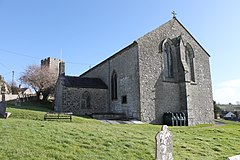Henllan
| Henllan | |
|---|---|
 Church with tower behind | |
Location within Denbighshire | |
| Population | 862 (2011) |
| OS grid reference | SJ022681 |
| Community |
|
| Principal area | |
| Country | Wales |
| Sovereign state | United Kingdom |
| Post town | DENBIGH |
| Postcode district | LL16 |
| Dialling code | 01745 |
| Police | North Wales |
| Fire | North Wales |
| Ambulance | Welsh |
| UK Parliament | |
| Senedd Cymru – Welsh Parliament | |
Henllan is a village and community in Denbighshire, Wales with a population of approximately 750 (OfNS/2004) and lies in the countryside, approximately 2.25 miles (3.5 km) north-west of the walled town of Denbigh. The name is Old Welsh, Hên-llan, meaning "old church-enclosure". The population had increased to 862 at the 2011 census.[1] Foxhall Newydd, a Grade I listed country house, lies to the southeast.
Church and bell tower
The tower of Saint Sadwrn's church is unusual in that it was built separate to the main building housing the congregation. The stone tower, which is built on a raising rock, is sited at the highest point in the churchyard. It is thought this was to increase the range the tolling bells could be heard by parishioners. The traditional parish of Henllan covered a large area; today it forms part of the Benefice of Henllan, which includes the parishes of Henllan, Bylchau and Gwytherin.[2]
The Ghost of Llindir
The village's only pub is believed to be one of the oldest in Wales. The Llindir Inn is a 13th-century partially thatched building, and is well known for its ghost. Dewi Roberts, in his book The Old Villages of Denbighshire and Flintshire, writes how pub-goers have seen 'an attractive woman in white' (described elsewhere as a woman in blue[3]). She's believed to have been married to a sailor, and while he was away at sea, she found herself a lover. One winter night her husband took unexpected shore leave, and caught them both in flagrante delicto. He murdered his wife, and from that moment on, a number of people claim to have seen her. The story attracted so much attention, that it was even part of a television programme back in the sixties.[2] Like all ghost stories, however, there are inaccuracies, and local legend has it that only females are able to see the ghost, known as Sylvia. She also appears only in the upstairs part of the pub and on cold frosty nights.
The 'ghost' legend was not known in the village prior to World War II, and probably originated as a means to encourage more trade, particularly from US troops stationed in nearby Denbigh.[citation needed]




